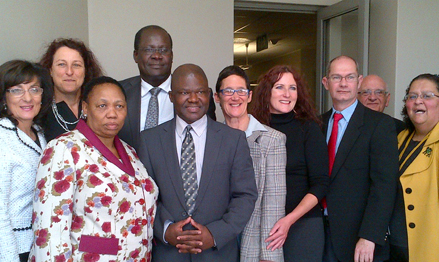Latest News Archive
Please select Category, Year, and then Month to display items
02 July 2019
|
Story Eloise Calitz
|
Photo Keagan Nkwaira
 Audience members listening attentively to the presentations at the Entrepreneurship Inter-varsity on the Bloemfontein Campus.
Audience members listening attentively to the presentations at the Entrepreneurship Inter-varsity on the Bloemfontein Campus.
The UFS continuously creates opportunities for students to develop and explore platforms where they can showcase their talents and share their innovative concepts. In the light of this, it is important for the institution to become a preferred academic knowledge partner that can conceptualise, develop, and successfully commercialise research activities, and through this foster an innovative and entrepreneurial culture that aligns to its Integrated Transformation Plan.
This is why opportunities such as the Entrepreneurship Intervarsity Competition are so important, since it encourages students to demonstrate their entrepreneurial talent, and through this connect with investors and industry leaders to start up a business.
The competition
Student entrepreneurs across the 26 public universities in South Africa were invited to submit their innovative ideas as part of a competition supported by Entrepreneurship Development in Higher Education (EDHE), in collaboration with the Allan Gray Orbis Foundation. The opportunities created through this initiative are twofold:
1. For student entrepreneurs to present their innovative ideas and businesses.
2. For universities to demonstrate their entrepreneurial talent and the ways in which they support and grow the next generation of business leaders.
The competition takes place in five stages. The process started with each student submitting their short videos and applications on the official competition site. Each institution also had the opportunity to select student entrepreneurs to take part in the competition. Fifteen students pitched their ideas during internal rounds at the UFS on 30 May 2019. Of these students, four were selected to represent the UFS at the regional rounds of the Entrepreneurship Intervarsity, where the finalists will be chosen.
The students were judged in four categories:
• Category 1: Innovative Ideas
• Category 2: Tech Businesses (existing businesses, formal or informal, undergrad or postgrad)
• Category 3: Social Impact Businesses (existing businesses, formal or informal, undergrad or postgrad)
• Category 4: General (existing businesses, formal or informal, undergrad or postgrad)
The following UFS entrants were selected to take part in the regional finals:
• Christopher Rothman for his liquid yeast culture that can be used in the fermentation of beer.
• Driaan-Lou Kemp for his patented water-saving device.
• Grace Mthembu for her electricity-saving system.
• Martin Clarke for his idea to use drone technology for the mining industry
UFS plays leading role in implementing curriculum for deaf learners
2013-08-15
|
 |
Minister Angie Motshekga (front left) joined by members of the South African Sign Language task team. Behind Minister Motshekga’s shoulder is Dr Philemon Akach.
15 August 2013 |
South African Sign Language (SASL) will soon be offered as a school subject to Grade 0–12 learners in all 42 schools for the deaf in South Africa. Our Department of South African Sign Language had a role to play in this significant development that will empower deaf learners in South Africa and the continent.
Dr Philemon Akach, Head of the Department of South African Sign Language at the UFS, is part of the nine-member task team that recently handed over the SASL curriculum to the Minister of Basic Education, Angie Motshekga. The curriculum will be offered as a home language in all schools from 2014 and Grade 12 learners will be able to write it as a final-year examination subject.
Dr Akach – a member of the task team since 2009 – helped to coordinate the development of the curriculum.
The implementation of the curriculum means a lot to the Department of South African Sign Language, Dr Akach says. “We have championed the linguistic needs of the deaf community ever since we became the first university to offer SASL as an academic course, not only in South Africa, but also on the continent.”
Dr Akach says most Education students are already taking SASL as subject in his department, equipping them as prospective teachers to make implementation of the curriculum a smooth one. “Given our expertise, we will train teachers in the field and be involved in the setting and moderation of exam papers. The University of the Free State is no doubt a leader in this field.”